| How has Bible truth survived, from different Bibles, in different scripts? Q3: How has Bible truth survived? Hypothesis: How has Bible truth survived, from different Bibles, in different scripts? Introduction: The Hebrews wrote the the messages of GOD in Hebrew in their language and culture. This message was translated into different languages as a witness to the original messages of GOD. As each culture made copies of their copies, the messages become corrupt over time, as different scribes read each letter according to the various skills they had. Since the messages were considered "holy", scribes were very careful in making copy after copy by hand and cross checking the page for errors. It is remarkable of the thousands of manuscripts that have survived in various languages, how little they disagree from each other over the centuries of copying. While there are errors there is enough truth preserved for any believer to seek the salvation of GOD through the written messages of inspired men. Method: See presentation Conclusion: The most original Hebrew is known as Ancient Hebrew, is similar to the paleo-Hebrew of the Samartian's Bible. As the Hebrew Masoretic Texts became copied and recopied, the other language scripts can be used to cross check the Scriptures to see what the "truth" would have been if written in it's original Hebrew. This is especially useful comparing the Peshitta against the poorer translations of the Greek. These other language scripts help complement the Hebrew, and make certain we have as close as possible the original Hebrew found in the written Scriptures. Discussion: Below is a brief summary of how the "truth" came to us from the Hebrew writers who wrote messages as the Holy Spirit moved them to write. 150 BC 
The dead sea scrolls written from 400BC to 100 BC are mostly written in Hebrew. 
100 BC Alexander the Great conquered Jerusalem in 300BC. He spared the city because the High Priest showed him Hebrew Scripture prophecy concerning Alexander. Here are some nice words from "The Trumpet.com" :- "About 180 years before Alexander was born, the Prophet Daniel wrote his book, canonized in the Bible. Daniel 10:1 states that he wrote it in the third year of the reign of Cyrus the Great, which historians agree was around 535 b.c.Jaddua would have showed Alexander such passages as Daniel 11:2-3, describing the Persian Empire pushing against Greece and eventually being conquered by a powerful Greek ruler: "Behold, there shall stand up yet three kings in Persia; and the fourth shall be far richer than they all: and by his strength through his riches he shall stir up all against the realm of Grecia. And a mighty king shall stand up, that shall rule with great dominion, and do according to his will." Jaddua also likely showed Alexander the passages in Daniel 8 that give more details about this "mighty king" of Greece who would defeat the Persians. These passages truly are about Alexander the Great, and they were written around 200 years before his reign began! You can imagine Alexander standing in the temple next to the priest. You can imagine him being shown an ancient scroll of Daniel's words. Thanks to the education he had received from Aristotle, he could read the Hebrew Daniel had written. He needed no translation. This glimpse back into a seldom-discussed chapter of Alexander's life shows how prophecy and history intersected in a dramatic way. It also adds a layer of authenticity to the biblical record. " 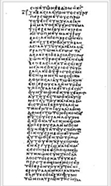 The LXX Greek Bible. The LXX Greek Bible.
After Alexander, other Greek Princes, such as Ptolemy II ordered the Hebrew Scriptures be translated into the Greek language. So 70 Jewish scholars wr ote the Septuagint, the first Greek copy of the Bible, in around 100 BC. This work is also known as the LXX, and is used as the major tool for bridging the New Testament Greek back to the original New Testament Hebrew. 
100 BC 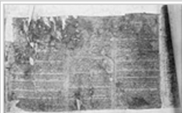
At the same time a despised nation of people, the Samaritans; continued to write their own messages of Hebrew into their own language, the very old paleo-Hebrew script, in which copies exist from 100 BC. 
400 AD Away to the north Syrian people also copied Hebrew scriptures into the Peshitta script in the Syriac language, which sort of looks Arabian. This script is most useful for cross-checking the copied Hebrew texts for errors that may have crept into copying the texts and for cultural bias. The Peshitta is far superior to the Greek, and shows up the New Testament in Greek as a poorer translation of the Hebrew.  The oldest Peshitta documents are from 400 AD. The oldest Peshitta documents are from 400 AD.

500 AD 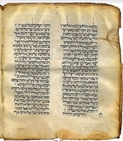 The Targum Scriptures. The Targum Scriptures.
As Greece and Rome conquered Israel over the years, a different Hebrew script developed called Aramaic Hebrew script. The documents from this script, the Targums, date from 500 AD. This trade script is 80% the same as old Hebrew, nevertheless scholars assumed Aramaic was the common language of Palestine at the time of Jesus, rather than Hebrew. 
1000 AD As the Jews copied and re-copied the holy messages of Hebrew carefully, the oldest copies of Hebrew scriptures date from Masoretic Texts from around 1,000 AD. We can compare the accuracy of the copying process from comparing thousands of manuscripts against the dead sea scrolls and other language scripts. The copies are almost the same, except for a few spelling errors in sounds, the messages truly have been preserved despite the copying process. 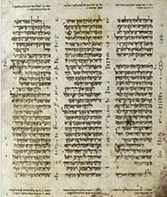 Masoretic Texts Masoretic Texts

5,000 AD  Latin Vulgate Latin Vulgate
The oldest most complete Bible is the Latin Vulgate dating from the 5th century AD. It is a valuable copy of the Scriptures being carefully translated into Latin from the oldest original sources of Hebrew and Greek at the time. 
present truth The best Bible for a beginning believer is one he or she can read. The SEED of Jesus can grow in any soil under any light you receive. As you develop more maturity and thirst for more of God's truth, your desire for His love will deepen. Knowledge however will not save you, only a relationship with Jesus will. Learning Hebrew will not help you get to heaven, but it will help you appreciate the thinking of the people who wrote the Bible and thus help you to see GOD as they saw GOD through their eyes. Once you see how they saw GOD, than you can appreciate the "truth" coming into your culture and with your understanding of His love. 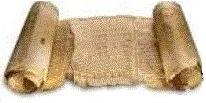
First see the Bible in Hebrew because Hebrew prophet's wrote it first. Second: adapt GOD's love, via the Holy Spirit; into your cultural thinking. Now you have the "truth" in your culture without bias. Shalom Jeff Benner theme   |
|
 See for more themes.
See for more themes.